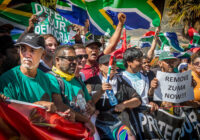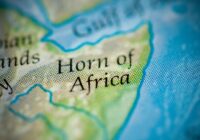With Ethiopia and Eritrea pushing for peace, will Djibouti declare diplomatic war?
These are heady times in the Horn of Africa. A monumental rapprochement orchestrated over the past month by Ethiopia’s new, reformist prime minister, Abiy Ahmed, has effectively ended the decades-long cold war between Ethiopia and Eritrea. Addis Ababa and Asmara are pressing ahead to bridge divisions, open embassies, develop ports and resume flights between the two neighbors. Ethiopians and Eritreans are calling each other at random, giddy that the hatred and hostility that have been the legacy of the Eritrean War of Independence may finally be at an end.
The push for peace could also prove lucrative for both countries. Reconciliation with Eritrea helps grant landlocked Ethiopia — a nation of 100 million people and Africa’s seventh largest economy — access to new ports on the Red Sea. Abiy is currently pursuing an aggressive reform agenda and opening up his country after a decades-long slide toward paranoid authoritarianism. On the other side of the disputed border, Eritreans hope the new accord will finally bring an end to their country’s extreme poverty and inhumane system of indefinite and compulsory “non-military service.”
Peace between Ethiopia and Eritrea offers plenty of room for (cautious) optimism, but the events of the last month represent, at best, a start. Abiy is trying to navigate his role as what the Atlantic Council’s Bronwyn Bruton calls an “all-around compromise candidate.” He still needs to deal with both hardliners and high expectations at home. Eritrean President Isaias Afwerki faces challenges as well. He may have accepted Abiy’s overtures, but he has given no indication he is ready to give up the power he has maintained through brutal repression for a quarter of a century. By accepting Abiy’s olive branch, the 71-year-old strongman may struggle to justify some of his harsher policies that hinge on war footing.
And then, of course, there is the question of how other powers in this volatile and strategic region will try to influence, exploit or otherwise undermine this drive toward reconciliation. The US evidently backs the Ethiopian premier’s agenda as it hopes to draw the country away from China, which has invested much in the East African state, including $13 billion in loans from 2006 to 2015. America’s most senior diplomat in Africa, Donald Yamamoto, is said to have hosted meetings behind the scenes and steered a diplomatic back channel alongside Eritrea’s allies in the Gulf, Saudi Arabia and the United Arab Emirates.
And then there is the one local player — Djibouti, which neighbors both Ethiopia and Eritrea — that stands to lose the most from the shifting state of affairs. Djibouti has exploited its prime territory between Ethiopia and the Red Sea to serve as Addis Ababa’s most important port. The lack of access to Eritrean ports has meant 90% of Ethiopia’s trade comes through the Port of Djibouti. This symbiotic relationship goes both ways, with 85% of cargo traffic at the port either originating in Ethiopia or making its way there. In May, Ethiopia agreed to take a stake in the port that has effectively been its sole point of access to maritime commerce.
Djibouti’s status as the gateway to Ethiopia has made it a magnet for Chinese investment as well, to such an extent that outside observers have repeatedly warned the tiny country’s debts to Beijing are unsustainable. Djibouti’s debt-to-GDP ratio already stands at 88%, and most of this debt is in Chinese hands. This “debt trap” is only growing deeper with the construction of a Chinese-backed, $3.5-billion free trade zone in Djibouti.
China’s outsized influence in Djibouti has already discomfited the other foreign powers who rely on port access and military real estate there, including America, whose only permanent military base in Africa is in Djibouti. Earlier this year, Djibouti shocked the international community by violating a 30-year concession granted to the UAE-based DP World and unilaterally seizing its Doraleh Container Terminal back from the company.
On August 2, the London Court of International Arbitration ruled decisively in the company’s favor by insisting the contract between Djibouti and DP World was “valid and binding.” Djibouti has spent much of this year heatedly, if unconvincingly, denying that its actions were carried out in favor of Chinese interests. Djibouti’s autocratic leader, Ismail Omar Guelleh, has profited immensely from Ethiopian shipping and Chinese investment. His golden goose may have run out of eggs, however. Even before making up with Eritrea, Addis Ababa had begun working together with partners in the UAE to develop the Berbera Port in Somaliland as an alternative option. Now that Ethiopia is finding closer and more convenient ports in Eritrea, Djibouti’s lucrative niche and a key source of annual revenue could be about to go up in smoke.
Will Djibouti scuttle the peace in response? Recent events indicate that Guelleh and his officials intend to try. The country has a longstanding diplomatic disagreement with Eritrea over their own disputed border, and Djibouti reacted angrily to a Somali plea to lift UN Security Council sanctions on Eritrea and facilitate Eritrea’s re-entry into the international community.
The stakes of this diplomatic wrangling could extend far beyond the borders of Ethiopia’s tiny and increasingly problematic neighbor. As the Atlantic Council’s Kelsey Lilley explains: “At the least, this tectonic shift will reduce the revenues available to [Guelleh], in power since 1999, and undermine his ironclad grip on the country. At worst, Djibouti could prove a spoiler, which would threaten prospects for regional peace as well as longstanding US strategic interests in the Horn of Africa.”
As with any major diplomatic shift, this new state of affairs will produce new winners and losers in one of the most strategic corners of Africa. For Abiy Ahmed, peace with Eritrea offers an opportunity to change the lives of well over a hundred million people in two countries for the better. For Guelleh, rapprochement between his two neighbors represents an existential threat. As Lilley makes clear, the rest of the region will need to watch carefully to determine what he is willing to do about it.
The views expressed in this article are the author’s own and do not necessarily reflect Fair Observer’s editorial policy.
Photo Credit: Hailu Wudineh TSEGAYE / Shutterstock.com
Support Fair Observer
We rely on your support for our independence, diversity and quality.
For more than 10 years, Fair Observer has been free, fair and independent. No billionaire owns us, no advertisers control us. We are a reader-supported nonprofit. Unlike many other publications, we keep our content free for readers regardless of where they live or whether they can afford to pay. We have no paywalls and no ads.
In the post-truth era of fake news, echo chambers and filter bubbles, we publish a plurality of perspectives from around the world. Anyone can publish with us, but everyone goes through a rigorous editorial process. So, you get fact-checked, well-reasoned content instead of noise.
We publish 2,500+ voices from 90+ countries. We also conduct education and training programs
on subjects ranging from digital media and journalism to writing and critical thinking. This
doesn’t come cheap. Servers, editors, trainers and web developers cost
money.
Please consider supporting us on a regular basis as a recurring donor or a
sustaining member.
Will you support FO’s journalism?
We rely on your support for our independence, diversity and quality.






